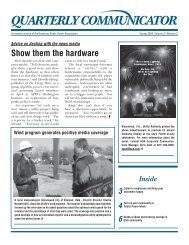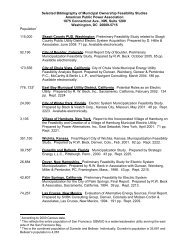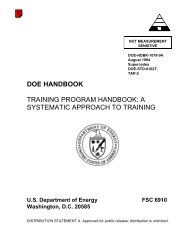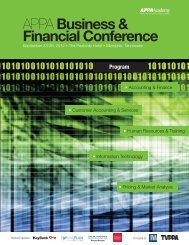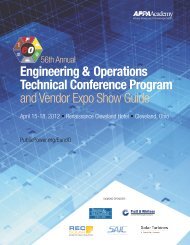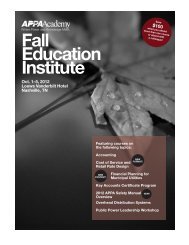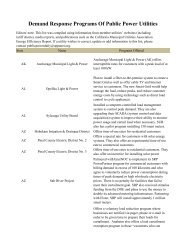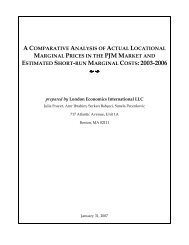Safety Training Brochure - American Public Power Association
Safety Training Brochure - American Public Power Association
Safety Training Brochure - American Public Power Association
- No tags were found...
Create successful ePaper yourself
Turn your PDF publications into a flip-book with our unique Google optimized e-Paper software.
Save $100when you attendmore than onecourse or attendwith a colleague!New!<strong>Safety</strong> <strong>Training</strong>October8–10, 2013Fall Education InstituteSan Antonio, TexasFeaturing the following courses:Overview and Practical Applicationsof the APPA <strong>Safety</strong> ManualEstablishing a <strong>Safety</strong> Culture at Your UtilityAccident Investigation and Near Miss ReportingPractical Field Application of the2012 National Electrical <strong>Safety</strong> CodeCo-sponsored by:Texas <strong>Public</strong> <strong>Power</strong> <strong>Association</strong>
<strong>Safety</strong> <strong>Training</strong>New!October 8–10, 2013Fall Education InstituteSan Antonio, TexasWorker safety is at the core of a utility’s commitment to service.This dedication to safety must be utility-wide and be evident inall aspects of utility operations. The use of a designated safetymanual, holding regular safety meetings, educating and engaging youremployees on the latest rules and procedures, and establishing a cultureof safety are all critical elements in ensuring the delivery of safe and reliableelectricity.To help utility employees achieve these goals, APPA has included a trackof new safety courses into its Fall Education Institute:n Overview and PracticalApplications of theAPPA <strong>Safety</strong> ManualOct. 8n Establishing a <strong>Safety</strong> Cultureat Your Utility Oct. 9n Accident Investigationand Near Miss ReportingOct. 9n Practical Field Application of the2012 National Electrical <strong>Safety</strong>Code Oct. 10Course HighlightsExperiencedInstructorsLearn from instructors whohave decades of experiencein the electric utility industryand understand the specificneeds of public power utilities.Earn Valuable PDHsUnique TeachingEnvironmentInstructors apply real-worldexamples to the training,drawing from their extensiveindustry experience and trainingbackgrounds.Instructors also incorporategroup discussion, videos,demonstrations, check-upquizzes and Q & A sessions.Take-Home ValueEach attendee receives acomprehensive manual thatcontains all course materialsand supplemental informationto reference back at theoffice.Attendees in the APPA<strong>Safety</strong> Manual course willreceive a copy of the latestversion of this publication.Who Should AttendThese courses are designedfor managers, safety professionals,electric utility engineers,designers, technicians,field personnel and utilitystaff who are responsiblefor or who make decisionsconcerning safety withintransmission and distributionsystems.Attendees can receive up to19 professional developmenthours by attending thesecourses.
Overview and Practical Applicationsof the APPA <strong>Safety</strong> ManualTuesday, Oct. 88:30 a.m.–4:30 p.m.Recommended CEUs .7/PDHs 6.5Course OverviewJob-related injuries occur every day, often because employeesare not trained in proper procedures. Investing in safety educationis essential to identifying and eliminating hazards.The APPA <strong>Safety</strong> Manual helps establish the fundamentals ofcompliance and instill best practices to establish a commitmentto a safe work culture for utility employees. The 15th edition ofthe manual was published in 2012. Since 1955, it has set thepublic power standard for safety compliance information.The manual has been revised and expanded since its lastpublication in 2008 to incorporate a number of U.S. Occupational<strong>Safety</strong> and Health Administration and other federal andindustry standards. Updates include revisions and additions tothe following sections: General Rules (section 1), Health and EnvironmentalControl (section 2), Personal Protective Equipment(section 4) and Electric Utility Operations (section 5).In this course, the instructors will discuss the origins, organizationand practical applications of the APPA <strong>Safety</strong> Manual,in addition to highlighting the important changes effective withthe 2012 edition. There will be special emphasis on Section 507(Overhead Distribution and Transmission) to cover the intent andbackground of these safety rules.Course Topicsn APPA <strong>Safety</strong> Manual application, organization and purposen Significant revisions contained in the 2012 editionn Revised sections include: personal protective equipmentguidelines (clothing and rubber gloves), wireless electronicdevices, pole-top rescue, security, and CPR/first aid/AEDn New sections include: bucket truck/aerial lift rescue, substations,hazardous energy control (underground section)n Rule intents and interpretations; rule interpretation questionsand issues contributed by course participantsEach participant willreceive a copy of the2012 APPA <strong>Safety</strong> Manualn In-depth review of Overhead Distribution and Transmission(Section 507). This section includes topics such as:n Working on or Near Exposed Energy Lines and Equipmentn Climbing and Working on Polesn Working on Energized Lines Barehandedand with Live-Line Toolsn Working on De-Energized Lines and Equipmentn Groundingn Hazardous Energy ControlCourse LevelBasic. This course does not have prerequisites nor does itrequire advance preparation.InstructorsMike Byrd is the supervisor of safety and training for ElectriCitiesof North Carolina in Raleigh, N.C. He began his career withProgress Energy over 40 years ago as a lineman trainee. After18 years in line work, he began teaching line construction to apprenticesbefore joining ElectriCities.Mike Willetts is the director of training and safety for the MinnesotaMunicipal Utilities <strong>Association</strong>. He has more than 33 yearsof experience in the electric utility industry and has developedand managed MMUA’s safety management program for thepast 18 years. He is the past chair of the APPA <strong>Safety</strong> Committeeand Engineering & Operations Section and chaired APPA’s<strong>Safety</strong> Manual revision task force. He is an active member ofthe Institute of Electrical and Electronics Engineers, Minnesota<strong>Safety</strong> Council, National <strong>Safety</strong> Council and the MinnesotaOSHA Electric Task Force.
Establishing a <strong>Safety</strong> Culture at Your UtilityWednesday, Oct. 98:30 a.m.–Noon.Recommended CEUs .3/PDHs 3Course OverviewFor safety values to become established in an organization,they must be reinforced by decision makers. In this course,participants will learn how to establish a safety culture from topto bottom and how to transfer these strategies throughout theworkplace, ensuring more effective safety supervision methodologies.Course Topicsn Why a utility should have a safety programn Management support: why and hown <strong>Safety</strong> meeting typesn Supervisor priorities, responsibilities and accountabilityn Employee training and motivationn Employee involvement and getting “buy-inCourse LevelBasic. This course does not have prerequisites nor does itrequire advance preparation.InstructorMike Byrd, supervisor, safety and training, ElectriCities ofNorth Carolina, Raleigh, N.C.Accident Investigation andNear Miss ReportingWednesday, Oct. 91:30–5 p.m.Recommended CEUs .3/PDHs 3Course OverviewConducting accident investigations and developing a platformfor reporting and recording near misses are critical practices thatcan prevent future incidents from unsafe behavior or conditions.This course will highlight the important role of near-missreporting in the culture of safety at a utility; developing a positiveplatform for reporting and recording near misses to preventthem from escalating to lost-time incidents; conducting accidentinvestigations with emphasis on root cause analysis; and how touse this information to prevent future incidents.The instructor will discuss step-by-step reporting methods fornear misses and how to educate employees on the importanceof training documentation. Participants will also work throughpractical group exercises, using utility case studies, to learn howto investigate and perform a root cause analysis.Course Topicsn Goals of accident investigation and preventionn Value of reporting and recording near missesn Importance of maintaining training recordsn Accident prevention through educationn Performing an accident investigationn Root cause analysis methodsn Real-life case study exercisesCourse LevelBasic. This course does not have prerequisites nor does itrequire advance preparation.InstructorMarc Machacek is the regional safety coordinator for the MinnesotaMunicipal Utilities <strong>Association</strong>. He is responsible for allaspects of accident investigation within the association’s membership.He is an accredited safety professional and teaches anumber of courses for MMUA’s safety management program,ranging from Occupational <strong>Safety</strong> and Health Administration(OSHA) and Department of Transportation (DOT) safety trainingto on-site audits and inspections, safety committee leadershipand jobsite safety classes.
Participants are required tobring a copy of the 2012NESC book to the course.Practical Field Application of the2012 National Electrical <strong>Safety</strong> CodeThursday, Oct. 108:30 a.m.–4:30 p.m.Recommended CEUs .7/PDHs 6.5Course OverviewThe National Electrical <strong>Safety</strong> Code is the single most importantreference for electric utility engineering, construction and operationspersonnel. This course focuses on the practical applicationof the NESC to situations commonly encountered in the field.Through the use of photos, video clips, and accident/litigationcase studies, participants will learn how to recognize in thefield and correct common NESC violations and safety hazards.Participants will also gain a better understanding of the purpose,organization, enforcement and legal implications of the NESCfor themselves and their utility. Participants will share situationsinvolving NESC violations and compliance issues on their ownsystems for group discussion.Course Topicsn Purpose, scope, basic application andlegal implications of the NESCn Practical application of NESC requirements throughthe use of distribution construction standardsn Practical application of NESC requirementsfor field inspection and testingn Practice in identifying commonly encounteredNESC violationsn Substation security, signage, and use of enclosed spacesn Overhead lines and underground linesn Grounding and work rulesn Review of relevant accident and litigation casesn Discussion of NESC interpretation and compliance issuescontributed by participantsCourse LevelBasic/Intermediate. This course does not have prerequisitesnor does it require advance preparation.InstructorR. John Miner, P.E., is president of Collaborative Learning,Inc., of Austin and San Antonio, Texas, and has over 40 yearsof experience in the electric utility industry. Before forming hisown company, John served as chief operating officer for theAustin, Texas, Electric Utility Department, as general managerof the Rochester, Minnesota <strong>Public</strong> Utilities, and as an assistantprofessor on the faculty of the University of Houston’s College ofTechnology.Upcoming Technical <strong>Training</strong>Winter Education Institute n February 3-7, 2014 n New Orleans, La.Save $100when you attendboth courses orattend with acolleague!Learn from instructors who have over 30 years of utility industry experience!Constructing, Operatingand Maintaining UndergroundDistribution SystemsFeb. 3–6, 2014Advanced Topics in UndergroundDistribution SystemsFeb. 7, 2014These courses are tailored to:n Managersn Electric utility engineersn Designers and techniciansn Construction, operations and field personnelVisit www.APPAAcademy.org for more information.
Registration and Hotel InformationFour Convenient Ways to Register1. Register online at: www.APPAAcademy.org under“courses and workshops.”You will need a username and password to register.2. Fax your registration to: 202/495-74843. Scan and email your registration to:JRamdat@<strong>Public</strong><strong>Power</strong>.org4. Mail your registration form and payment to:<strong>American</strong> <strong>Public</strong> <strong>Power</strong> <strong>Association</strong>P.O. Box 418617Boston, MA 02241Hotel InformationHyatt Regency123 LosoyaSan Antonio, TX 78205APPA Room Rate$179 Single/DoubleRoom Rate Cut-off DateSeptember 16, 2013Reservations210/222-1234Please note: It is possible for APPA’s block of rooms to sellout prior to Sept. 16, so please make your hotel reservationsearly.Hotel Reservation & Cancellation PolicyAll reservations require a non-refundable room deposit equal toone night room and tax that will be charged to your credit cardat the time your reservations is made. Note: In the event thatAPPA cancels a course, this deposit will be waived.Cancellations/No-Show/Refunds/SubstitutionsRegistrants who cancel in writing on or before September 30,2013, are entitled to a refund of their registration fee, minus a$50 cancellation fee. Registrants who cancel after September30, will not receive a refund, but attendee substitutions will beallowed for this event only. Registrants and no-shows who donot cancel by Sept. 30 are responsible for the full registration feeand are not entitled to a refund.Cancellations must be made in writing and mailed, faxed, ore-mailed to:Janaya RamdatMeetings Coordinator<strong>American</strong> <strong>Public</strong> <strong>Power</strong> <strong>Association</strong>1875 Connecticut Ave, NW, Suite 1200Washington, DC 20009-5715Fax: 202/495-7484E-mail: JRamdat@<strong>Public</strong><strong>Power</strong>.orgTravel ArrangementsTravel arrangements and costs are the responsibility of theparticipants. APPA will not reimburse for changes in travelexpenditures regardless of the cause, including the cancellationof a course, meeting, or workshop. Before booking your airfare,please verify with Meghan Riley (202/467-2919 or MRiley@<strong>Public</strong><strong>Power</strong>.org) that the course(s) you are registering for will beheld.ConfirmationsConfirmations will be sent via e-mail.Name BadgesName badges can be picked up at the APPA registration deskat the hotel starting at 8 to 8:30 a.m. on the first day of eachcourse.MealsBeverage breaks are included in the registration fee. All mealsare on your own.Questions?Please contact Meghan Riley at 202/467-2919 or MRiley@<strong>Public</strong><strong>Power</strong>.org.LocationAll courses will be held in the Hyatt Regency hotel. The hotel(located on the San Antonio River Walk) is 12 miles from the SanAntonio International airport. Taxi fare from the airport is approximately$25 each way.
Registration FeesRegistration Received On/Before Registration Received After Sept. 16Sept. 16APPA Members Nonmembers APPA Members Nonmembers<strong>Safety</strong> <strong>Training</strong>Overview and Practical Applications $445 $645 $495 $695of the APPA <strong>Safety</strong> Manual, Oct. 8Establishing a <strong>Safety</strong> Culture $245 $445 $295 $495at Your Utility, Oct. 9Accident Investigation and $245 $445 $295 $495Near Miss Reporting, Oct. 9Practical Field Application of the $445 $645 $495 $6952012 National Electrical <strong>Safety</strong> Code, Oct. 10Registration Fee DiscountsSave $50 when you register before Sept. 16.Save $100 when you attend more than one course or attend with a colleague.Only one of the following discounts may be taken, when applicable.n Participants who take more than one course may subtract $100 from their registration fee total.ORn Utilities that send more than one participant to the course(s) may subtract $100 for each additional person.AccreditationContinuing Education UnitsThe <strong>American</strong> <strong>Public</strong> <strong>Power</strong> <strong>Association</strong> has beenapproved as an Authorized Provider by the International<strong>Association</strong> for Continuing Education and<strong>Training</strong> (IACET), 1760 Old Meadow Road, Suite 500, McLean,VA 22102; (703) 506-3275. In obtaining this approval, APPAhas demonstrated that it complies with the ANSI/IACET 1-2007Standard which is recognized internationally as a standard ofgood practice. As a result of their Authorized Provider membershipstatus, APPA is authorized to offer IACET CEUs for itsprograms that qualify under the ANSI/IACET 1-2007 Standard.For more information on APPA’s certification status, attendancerequirements and obtaining attendance transcripts, visitwww. APPAAcademy.org under “Accreditation” or contact HeidiLambert, Education Manager, at 202/467-2921 or HLambert@<strong>Public</strong><strong>Power</strong>.org.Professional Development HoursAPPA educational practices are consistent with the criteria forawarding Professional Development Hours (PDHs) as establishedby the National Council of Examiners for Engineering andSurveying (NCEES). Course eligibility and number of PDHs mayvary by state.About the APPA AcademyWith options as varied as live, in-depth courses and conferences,customized in-house training programs, and webinars,the APPA Academy offers top-notch education in formats andprice ranges to suit every need. Visit www.APPAAcademy.organd discover why no one understands the educational needs ofpublic power utilities better than APPA.
New!<strong>Safety</strong> <strong>Training</strong>October8–10, 2013Fall Education InstituteSan Antonio, TexasFeaturing the following courses:Overview and Practical Applicationsof the APPA <strong>Safety</strong> ManualEstablishing a <strong>Safety</strong> Culture at Your UtilityAccident Investigation and Near Miss ReportingPractical Field Application of the2012 National Electrical <strong>Safety</strong> CodeCo-sponsored by:Texas <strong>Public</strong> <strong>Power</strong><strong>Association</strong>Save $100when you attendmore than onecourse or attendwith a colleague!1875 Connecticut Ave, NWSuite 1200Washington, DC 20009-5715First Class MailPresortedU.S. Postage PaidWashington, DCPermit No. 605www.<strong>Public</strong><strong>Power</strong>.org





